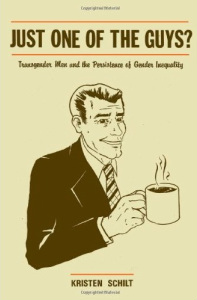 I've been reading Kristen Schilt's book, Just One of the Guys?, which details FTMs' workplace experience. She interviews more than 50 trans men about their transitions' effects on how they were received in their places of employment. About half the men she interviewed applied for their current jobs as men, and weren't out as trans at work. The other half transitioned while in the workplace, so their co-workers knew them as women, then as men. Schilt, to her own surprise, finds that the majority of FTMs have very positive workplace experiences, and--here comes the disturbing part--report that they are treated better by their co-workers once they start presenting as men. This was true for both sets of trans men, even those whose co-workers previously knew them as women! Straight cismen in the workplace embraced the FTMs "as" men--for example, inviting them to play tackle football with other men in the office, taking them to Hooters, or offering to teach them how to do "man stuff." On one hand, this study is encouraging, and somewhat hopeful for the acceptance of trans men in the workplace. But on the other hand, as Schilt says, the idea that the same person is treated much better when presenting as a man than presenting as a woman really highlights the continuing presence of gender inequality in the workplace! Also, since a lot of the trans men presented as butches before transitioning, I wonder: were FTMs treated better post-transition because they were no longer seen as women, or because they were no longer seen as gender-deviant women specifically? Maybe it's easier for people to understand a trans guy than a butch because (in terms of physical appearance) the trans guy fits into the gender dichotomy and the butch lesbian does not. So maybe this study doesn't show gender inequality as much as it shows inequality on the basis of gender conformity. I don't know.
1 Comment
Tallon Nunez
5/18/2011 03:53:32 am
It isn't even a little surprising that FTM's get treated better after they transition. The value of women is based upon whether men desire/have sexual access to us, the women who conform to what men want sexually have greater access to power and resources via the men they are involved with (or could potentially be with), while the women who do not conform i.e. fat, disabled, butch, etc. are very limited in their access to power/resources. Butches make a statement with our butchness that we do not require or desire the sexual attentions of men, and are seen as being competition, since we date women. It is erroneously assumed that we actually wish to be part of the boys club, so when we don't adhere to the boy's code of sexism, hierarchical mentality, classism, racism, etc. we make them very uncomfortable. To have value in our society, we must be sexually desirable and accessible to men, or be men, any in-between, such as being seen to be wanting to be men, but not actually being men, is a punishable offense. Women who are flat chested but get breast augmentation are also treated much better in the work place, simply because they have conformed to the male-dominated value system. Same with fat women who lose weight, etc. Gender conformity is fueled by gender inequality. If there were gender equality, I doubt very seriously that there would be such a thing as gender conformity, it just wouldn't be necessary. :-/
Reply
Your comment will be posted after it is approved.
Leave a Reply. |
|

 RSS Feed
RSS Feed